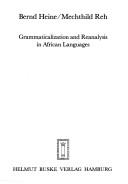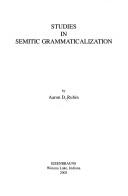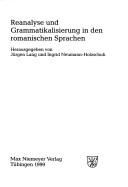| Listing 1 - 10 of 205 | << page >> |
Sort by
|

Abstract | Keywords | Export | Availability | Bookmark
 Loading...
Loading...Choose an application
- Reference Manager
- EndNote
- RefWorks (Direct export to RefWorks)
African languages --- Grammar --- -Grammaticalization --- Grammaticalization. --- Grammaticalization
Book
ISBN: 2801111937 Year: 1998 Publisher: Bruxelles : Duculot,
Abstract | Keywords | Export | Availability | Bookmark
 Loading...
Loading...Choose an application
- Reference Manager
- EndNote
- RefWorks (Direct export to RefWorks)

ISBN: 9789004370029 9781575069234 Year: 2005 Publisher: Winona Lake, Ind. Eisenmans.
Abstract | Keywords | Export | Availability | Bookmark
 Loading...
Loading...Choose an application
- Reference Manager
- EndNote
- RefWorks (Direct export to RefWorks)
This groundbreaking study examines the historical development of the Semitic languages from the point of view of grammaticalization, the linguistic process whereby lexical items and constructions lose their lexical meaning and serve grammatical functions. The author first provides an introduction to this process, followed by a comprehensive overview--with abundant examples from ancient and modern languages--of how it is exemplified in Semitic. Three successive chapters are devoted to in-depth studies of specific cases of grammaticalization: the definite article in Central Semitic, direct object markers across Semitic, and present tense prefixes in modern Arabic and Aramaic dialects. Drawing on evidence from many non-Semitic languages, from recent developments in the field of historical linguistics, and from traditional comparative Semitics, this book represents a major contribution to the field of comparative Semitics.

ISBN: 311092482X 3484304103 Year: 2016 Publisher: De Gruyter
Abstract | Keywords | Export | Availability | Bookmark
 Loading...
Loading...Choose an application
- Reference Manager
- EndNote
- RefWorks (Direct export to RefWorks)
Im Rahmen der in den vergangenen Jahren immer intensiver geführten Debatte über die Wege und Prozesse des Sprachwandels kommt den Begriffen Grammatikalisierung, Reanalyse bzw. Reinterpretation ein besonderer Stellenwert zu. Es hat allerdings den Anschein, als ob in bezug auf die Begrifflichkeit ein gewisses Maß an Konfusion herrscht. Sind Grammatikalisierung und Reanalyse einander ausschließende oder ergänzende Begriffe? Inwieweit implizieren Grammatikalisierungsprozesse Reanalyse und was unterscheidet beide Prozesse voneinander? Ausgehend von konkreten Beispielen aus den romanischen Sprachen nähern sich die Beiträge dieses Sammelbandes, der aus der Sektion »Zwischen Lexikon und Grammatik. Reanalyse in den romanischen Sprachen« beim Romanistentag in Jena 1997 hervorgegangen ist, der Fragestellung aus unterschiedlichen Richtungen. Neue Einsichten in die beiden Sprachwandelprozessen zugrunde liegenden kognitiven und sprachlichen Mechanismen vermitteln insbesondere diejenigen Beiträge, die Reanalyse und Grammatikalisierung mit Hilfe semantisch-pragmatischer Kriterien analysieren. In the context of the increasingly lively debate on paths and processes operative in language change, the concepts grammaticalization and reanalysis/reinterpretation are especially crucial. There does however appear to be a certain degree of confusion about what these terms actually refer to. Are grammaticalization and reanalysis mutually exclusive, or are they complementary? To what extent do grammaticalization processes imply reanalysis, and what is that distinguishes these two processes? On the basis of concrete examples from the Romance languages the articles assembled in this volume (a fruit of the Section titled »Between Lexicon and Grammar. Reanalysis in the Romance Languages« at the Romance Languages Conference in Jena in 1997) approach these questions from a variety of angles. New insights into the cognitive and linguistic mechanisms underlying these two processes in language change come notably from those studies analyzing reanalysis and grammaticalization with the aid of semantico-pragmatic criteria.
Book
Year: 2017 Publisher: Amsterdam, [Netherlands] ; Philadelphia, [Pennsylvania] : John Benjamins Publishing Company,
Abstract | Keywords | Export | Availability | Bookmark
 Loading...
Loading...Choose an application
- Reference Manager
- EndNote
- RefWorks (Direct export to RefWorks)

ISBN: 1575069237 9004370021 Year: 2005 Publisher: Winona Lake, Ind. : Eisenbrauns,
Abstract | Keywords | Export | Availability | Bookmark
 Loading...
Loading...Choose an application
- Reference Manager
- EndNote
- RefWorks (Direct export to RefWorks)
Book
ISBN: 3110753073 9783110753073 3110752948 9783110752946 Year: 2021 Publisher: Berlin De Gruyter Mouton
Abstract | Keywords | Export | Availability | Bookmark
 Loading...
Loading...Choose an application
- Reference Manager
- EndNote
- RefWorks (Direct export to RefWorks)
Grammaticalization has often been described as a gradual phenomenon. While many studies have discussed the quantitative aspects of grammaticalization, there has been little to no work that has tried to propose a way of measuring degrees of grammaticalization. This book addresses this gap by proposing a corpus-based approach to the measurement of grammaticalization, using binary logistic regression modelling. Such an approach has theoretical benefits as it can provide empirical evidence for the gradience and gradualness of grammaticalization. It can help substantiate observations that have been done on the basis of case studies so far, such as the hypothesized unidirectionality of grammaticalization. In addition, as the methods proposed in this book rely on corpus-based data only, it offers a way of comparing grammaticalization across multiple languages, which is currently a challenging endeavour. What this book hopes to achieve is to start a discussion on the measurement of grammaticalization. To draw a parallel, the field of morphological productivity has greatly benefited from the discussions (and disputes) regarding how its object of study should be measured, and I believe that so will the field of grammaticalization.
Gradience. --- Gradualness. --- Grammaticalization. --- E-books
Book

ISBN: 9783110563146 9783110559378 3110563142 3110560445 9783110560442 3110559374 Year: 2020 Publisher: Berlin Boston
Abstract | Keywords | Export | Availability | Bookmark
 Loading...
Loading...Choose an application
- Reference Manager
- EndNote
- RefWorks (Direct export to RefWorks)
This volume intends to fill the gap in the grammaticalization studies setting as its goal the systematic description of grammaticalization processes in genealogically and structurally diverse languages. To address the problem of the limitations of the secondary sources for grammaticalization studies, the editors rely on sketches of grammaticalization phenomena from experts in individual languages guided by a typological questionnaire.
Grammaticalization, Language Typology --- Grammatik --- Linguistik
Book
ISBN: 9027252815 9027213755 Year: 2023 Publisher: Amsterdam/Philadelphia John Benjamins Publishing Company
Abstract | Keywords | Export | Availability | Bookmark
 Loading...
Loading...Choose an application
- Reference Manager
- EndNote
- RefWorks (Direct export to RefWorks)
This volume on grammaticalization focuses on new theoretical and methodological challenges underpinning language change. It provides new approaches and insights deepening our understanding of the cognitive, pragmatic, and socio-cultural mechanisms that trigger the formation and the transformation of grammars.
Book
ISBN: 3926972858 Year: 2001 Publisher: Wilhelmsfeld : Egert,
Abstract | Keywords | Export | Availability | Bookmark
 Loading...
Loading...Choose an application
- Reference Manager
- EndNote
- RefWorks (Direct export to RefWorks)
Romance languages --- Grammar, Historical --- Grammaticalization
| Listing 1 - 10 of 205 | << page >> |
Sort by
|

 Search
Search Feedback
Feedback About UniCat
About UniCat  Help
Help News
News